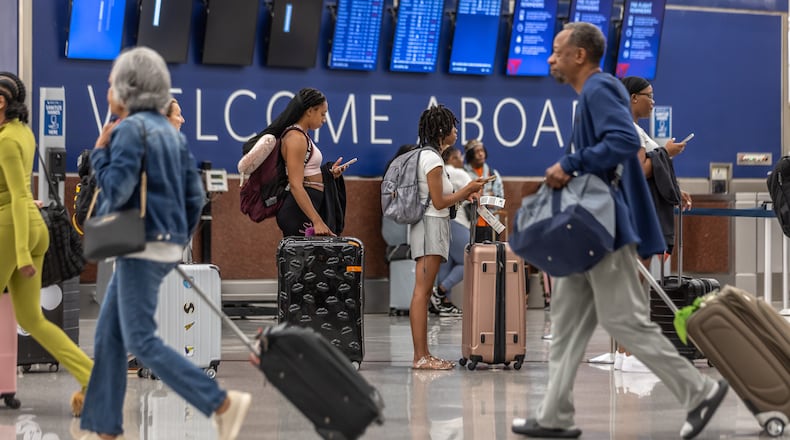CrowdStrike’s CEO said on CNBC this week that he wants to work with Delta Air Lines to resolve their differences after the carrier had an operational meltdown in July following a faulty software update from CrowdStrike.
Since the July 19 incident, which led to thousands of canceled flights, Delta has hired law firm Boies Schiller Flexner to pursue potential claims against CrowdStrike and Microsoft, and lawyers for the companies have exchanged letters with heated words, defensive postures and accusations.
In remarks to the cable channel the day after his company’s second-quarter earnings report, CrowdStrike’s top executive, George Kurtz, said he would like to resolve the dispute with Delta, which he called a key customer.
“We’d love to work with Delta to find a resolution around this,” he said.
Atlanta-based Delta estimated the technology outage — which affected Microsoft systems and upended the carrier’s operations for days, stranding passengers at airports around the world — had a financial impact of at least $500 million for the airline.
While the faulty security update disrupted other airlines and organizations, most recovered quickly. Delta did not.
“If CrowdStrike genuinely seeks to avoid a lawsuit by Delta, then it must accept real responsibility for its actions and compensate Delta for the severe damage it caused to Delta’s business, reputation and goodwill,” attorney David Boies, who represents Delta, wrote in a letter in early August.
In response, Quinn Emanuel attorney Michael Carlinsky, representing CrowdStrike, wrote that the tech security firm “strongly rejects any allegation that it was grossly negligent or committed willful misconduct.”
The letter also emphasized that CrowdStrike’s liability is “contractually capped at an amount in the single-digit millions.”
CrowdStrike also in early August issued a statement saying: “Public posturing about potentially bringing a meritless lawsuit against CrowdStrike as a longtime partner is not constructive to any party” and said “we hope that Delta will agree to work cooperatively to find a resolution.”
On Wednesday, during its second-quarter earnings call, CrowdStrike announced a $60 million incentive package, including discounted services, to help convince customers to stay.
CrowdStrike Chief Financial Officer Burt Podbere said during an investor conference call Wednesday afternoon “the outcome of litigation is inherently difficult to predict, particularly in the early stages. It is still too early for us to estimate any potential legal exposure we may have at this time.”
During an interview on CNBC on Thursday, Thursday, Kurtz reiterated interest in reaching an agreement with Delta.
“If, you know, folks can sit down, have a business conversation around this and try to come to a resolution, obviously we’re open to that,” Kurtz said. “Delta is a customer, and like any customer, you want to try to get this resolved in the most expeditious way. And we’re certainly willing and open to do that.”
Delta declined to comment in response.
Delta, in a filing with the U.S. Securities and Exchange Commission in early August, estimated it had about $380 million in lost revenue and about $170 million in expense from the disruption, with 7,000 flight cancellations over five days.
The outage, fallout and Delta’s response has trigged a U.S. Department of Transportation investigation.
Travelers have also filed lawsuits seeking class action status against Delta and CrowdStrike.
“We believe that CrowdStrike knew of the dangers of pushing out an ill-designed and poorly tested software update on a Friday,” Charles LaDuca, an attorney representing plaintiffs in a suit against CrowdStrike, said in a written statement. “This outage was no accident and at the very least could have been minimized had CrowdStrike acted responsibly.”
Rob Shelquist, another attorney representing plaintiffs in a suit against CrowdStrike, said as a result of the failed update, “Delta’s passengers still have unreimbursed losses for missed flights and connections, replacement flights, other travel costs, hotel bills, meals away from home and the lost value of concert tickets and other events they missed because of their canceled flights.”
In a statement, a CrowdStrike spokesperson said: “We believe these cases lack merit and we will vigorously defend the company.”
About the Author
Keep Reading
The Latest
Featured



